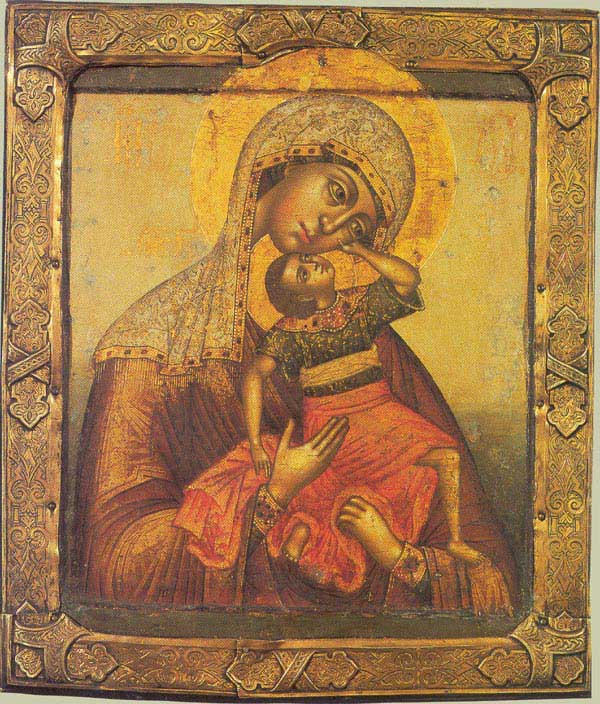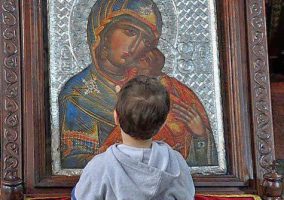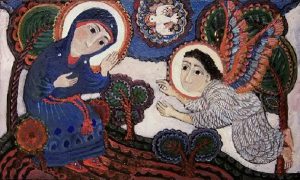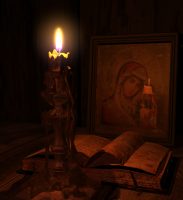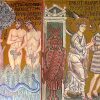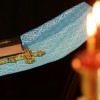The fast of the Dormition, when Orthodox Christians sing daily services to the Mother of God, is upon us. (Ed. note: The Dormition fast has begun for those following the New Calendar). It is just about every Protestant’s nightmare. But their knee-jerk rejection of our veneration of the Mother of God compels such Christians to ignore a great mystery which Orthodox Christians never tire of contemplating: we worship a God who has a mother.
This statement may seem paradoxical and nonsensical, but at its heart lies the very mystery of the Incarnation. Feasts of the Mother of God may seem at first glance to be concerned solely with the Virgin Mary, but in Orthodox Christianity, every feast of the Theotokos is really a feast about the One to whom she gave birth. “God became what we are that we might become what He is”.[1] So wrote St Athanasius the Great, and it is the first part of this affirmation – “God became what we are” – that we are invited to contemplate whenever we venerate the Virgin Mary. She is singled out for veneration above every other saint not on account of her holiness alone, but because it is through her that Christ entered the world.
But the mystery of the Incarnation does not end here. There is a danger in thinking of the Virgin Mary merely as a tool, a vessel, a means by which “the Word became flesh and dwelt among us” (John 1:14). Yet this becoming flesh meant not only a human body, but a complete human being: a human soul, a human mind, a human will, and everything else that is part and parcel of being truly human. This includes going through infancy, being fed and nurtured, taught how to speak and how to walk. And although Christ as God, who bears all creation in the palm of His hand, had no need to be taught by anyone, He chose to condescend to the fullness of humanity and to subject Himself to going through everything that we go through, with the exception of sin. The Virgin Mother was chosen to be not only the “Birth-giver of God” (Greek: Theotokos), but the “Mother of God” (Greek: Meter tou Theou). She gave Him the breast, reared Him, taught Him, and loved Him just as any mother does a child.
Whenever we wish to dehumanize someone, we tend to think of that person in isolation, forgetting that this person also has a mother, that he too was once an innocent baby. And when we wish to make people recognize that person’s humanity – the inherent goodness that exists even in the most evil of people – we remind them that this person too has a mother. In a similar way, if we wish to avoid dehumanizing Christ, we must remember that He too has a mother. We have a tendency to dehumanize heroes as well as villains. In so many action movies, our hero is frequently a character who was orphaned in childhood. It is as though we feel the need to take the parents out of the picture a soon as possible, because we cannot reconcile the helplessness, dependency and innocence of infancy with heroism, strength, power and might.
Similarly, some Christians like to ignore the fact that, having taken on the fullness of humanity, Christ too was a baby who cried, an infant who, like any other human being, had to increase in wisdom and stature (Luke 2:52). Therein lies the revelation of God’s amazing humility. As St Paul writes:
“[He] did not consider it robbery to be equal with God, but made Himself of no reputation, taking the form of a bondservant, and coming in the likeness of men. And being found in appearance as a man, He humbled Himself and became obedient to the point of death, even the death of the cross.” (Philippians 2:6-8).
Orthodox Christians do not, or should not, just casually accept the idea of God having a mother. Rather, it should stir in us wonder and humility. But we are so accustomed to hearing of the Birth of Christ and of the Mother of God that we are apt to forget what a strange and remarkable thing it is for God to be born. Christ is eternally begotten of the Father, but cannot be born, since there was a never a time that He was not.
Forget all you know of Christianity for a moment, and consider: if God were to come down to earth, what would it be like? How would His coming be? Surely one would imagine, in the words of Ghostbusters:
“A disaster of biblical proportions… real wrath of God type stuff… Fire and brimstone coming down from the skies! Rivers and seas boiling! Forty years of darkness! Earthquakes, volcanoes, the dead rising from the grave! Human sacrifice, dogs and cats living together, mass hysteria!”
But no. Instead He chooses to be born as a little child, a defenseless little baby. That same God of almighty power, whose presence, if manifested to us, really would be a disaster of biblical proportions, comes to us in complete meekness and humility. The One whose face no one can see and live (Exodus 33:20) becomes a baby for us, revealing to us all that is pure and good in humanity, and, at the same time, the humility of God.
If God did not shun the humility of a defenseless child, how much less should we despise frailty, weakness, poverty, meekness? Yet we dream of power and glory, forgetting that our Lord was born of a poor maiden in a manger. That God is Almighty is only one characteristic of God; that He is humble is another, equally important, characteristic. This humility is what made our salvation possible: He came down to earth, that He might raise us up to heaven; He descended that we might ascend; He humbled Himself that we might be exalted, and He died that we might live forever.
We can follow Christ because He followed us first; He came to rescue us by becoming one of us, and has raised us up to the throne of His heavenly Father. The only reason we can call God “Father” is because the Son of God became our brother. This is why Christ was the only one who could give us the Lord’s Prayer. Who else could bestow on us the “boldness to call upon You, the God of heaven, as Father, and to say: Our Father in heaven…”[2]?
Every feast of the Mother of God points us to Christ, to the mystery of the Incarnation: God became completely human while remaining completely God, thus uniting heaven with earth and God with man:
“… Today has grace begun to bear fruit, revealing to the world the Mother of God, through whom the earthly and the heavenly beings unite for the salvation of our souls.” (Vespers of the Nativity of the Mother of God, 4th troparion of the stichera)
We worship a God who, like all of us, had a mother. Because of this, we are able to call the God of heaven “Father”. By being born of woman and through His selfless condescension, humility and love, He has shown us what it means to be fully human.
[1] On the Incarnation 54.3 (Migne, Patrologia Graeca 25, 192 B: De Incarnatione Verbi, 54).
[2] The Divine Liturgy of St John Chrysostom












